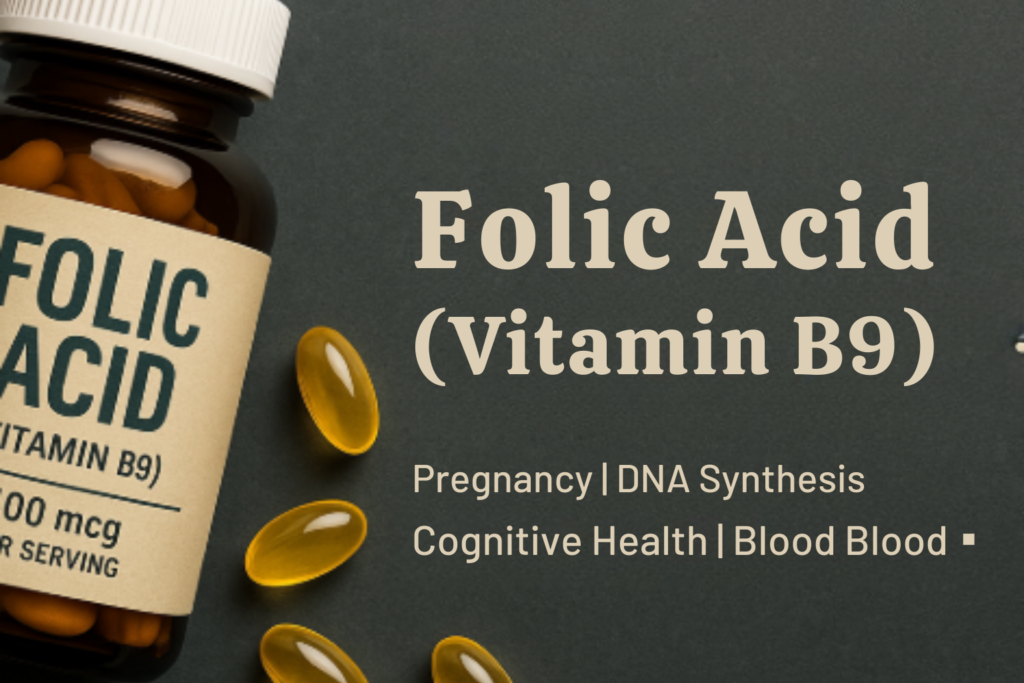Folic acid, also known as vitamin B9, is one of the most important vitamins for cellular metabolism, DNA production, and nervous system development—especially during pregnancy. It also plays a key role in blood formation, emotional balance, and protection against neurodegenerative diseases.
In this article, you’ll discover everything about folic acid: what it is, how it works in the body, its benefits, the importance of its active form (methylfolate), and why supplementation in capsule form is highly recommended at various stages of life.
What Is Folic Acid?
Folic acid is the synthetic, supplemental form of vitamin B9, a water-soluble B-complex vitamin. In the body, it is converted into its active form—5-methyltetrahydrofolate (5-MTHF)—to carry out its metabolic functions.
Folate is the natural form of B9 found in foods. However, many people have difficulty converting folate or folic acid into the active form, which is why methylfolate supplements are increasingly recommended.
Main Functions of Folic Acid in the Body
- Formation and maturation of red blood cells
- DNA and RNA synthesis (cell growth and regeneration)
- Fetal neurological development
- Mood balance and cognitive function
- Reduction of homocysteine, an inflammatory marker linked to heart disease
- Production of neurotransmitters like serotonin, dopamine, and norepinephrine
Benefits of Folic Acid Supplementation
- Prevention of Birth Defects
The main recommendation for B9 is for women of childbearing age and pregnant women. Supplementation:
- Prevents neural tube defects in the baby (e.g., spina bifida)
- Supports fetal brain and spinal cord development
- Reduces the risk of preterm birth
The World Health Organization recommends folic acid before and during pregnancy.
- Energy Production and Cellular Renewal
Because it is involved in DNA synthesis, folic acid is essential for:
- Tissue regeneration
- Blood cell production
- Increasing vitality and reducing fatigue
- Prevention of Megaloblastic Anemia
B9 deficiency leads to abnormally large red blood cells, causing:
- Chronic fatigue
- Pallor
- Shortness of breath
- Frequent headaches
Supplementation corrects and prevents this type of anemia.
- Support for the Nervous System and Mood
Folate is involved in the production of neurotransmitters related to emotional regulation. Deficiency can cause:
- Mild to moderate depression
- Irritability
- Difficulty concentrating
- Anxiety
Folic acid also works synergistically with vitamin B12 to protect neurons.
- Homocysteine Reduction
High homocysteine levels are linked to:
- Increased risk of heart disease
- Stroke
- Cognitive decline
B9 supplementation (especially in the methylfolate form) helps balance these levels.
Who Should Supplement?
- Women trying to conceive or who are pregnant
- People with restrictive diets or low intake of leafy greens
- Individuals with poor gut absorption or prolonged medication use (e.g., anticonvulsants, metformin, antacids)
- Those with mild depression
- Elderly individuals at risk of cognitive decline
- People with the MTHFR genetic mutation (difficulty converting folic acid to its active form)
Best Forms of Supplementation
- Synthetic folic acid – widely available, but requires metabolic conversion
- Methylfolate (5-MTHF) – active, highly bioavailable form; ideal for those with genetic mutations or low conversion
Tip: Whenever possible, choose supplements that contain methylfolate.
Recommended Dosage
- Healthy adults: 400 mcg per day
- Pregnant and breastfeeding women: 600 to 800 mcg per day
- Individuals with deficiency or genetic mutations: 400 mcg to 1000 mcg of methylfolate (under professional guidance)
B9 is safe for daily use but should respect dosage limits to avoid metabolic overload.
Synergistic Nutrients
- Vitamin B12 – supports red blood cell production and neurological protection
- Vitamin B6 – helps reduce homocysteine
- Magnesium – supports emotional regulation and energy metabolism
- Zinc and vitamin C – assist in absorption and effective use of folate
Precautions and Contraindications
- Excess synthetic folic acid can mask B12 deficiency
- Very high doses (>1000 mcg/day) should only be used with professional guidance
- Individuals with a history of cancer should evaluate use carefully
Final Considerations
Folic acid is an essential vitamin for life, cellular regeneration, and nervous system balance. Intelligent supplementation strengthens not only the body but also the mind and emotions—making it a key pillar in preventive health and vibrational longevity.
Whether you’re planning a healthy pregnancy, avoiding anemia, protecting the brain, or boosting vitality, B9 deserves a prominent place in your self-care routine.
